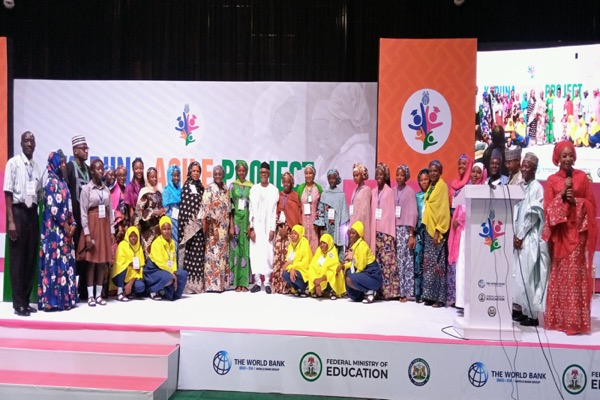The World Bank has commended the Kaduna State Government for taking ownership of its supported Adolescent Girls Initiative for Learning and Empowerment (AGILE) project.
The World Bank Country Director for Nigeria, Shubham Chaudhuri, made the commendation at the official inauguration of the project in Kaduna on Friday, May 12.
Chaudhuri, who was represented virtually by the bank’s Senior Education Specialist, Aisha Garba, also hailed Kaduna State Governor, Nasir El-Rufai, for the support to ensure the success of the project in the state.
Describing the project as a “huge success” in Kaduna State, Chaudhuri said supporting women and girls in Nigeria was at the top of the World Bank agenda.
According to him, AGILE is one of the biggest projects in the bank with $1.2 billion.
“This is to demonstrate the commitment of the bank to the development agenda of enhancing education opportunities and empowerment of young girls and women in Nigeria.
“We appreciate the full cooperation and partnership of stakeholders, and we will continue to support the government of Kaduna state in achieving this important agenda,” the World Bank official added.
Speaking at the event, the National Project Coordinator, Amina Haruna, stated that the AGILE project was the initiative of the Federal Government with funding support from the World Bank.
Haruna said the project aimed to ensure adolescent girls access quality secondary education, through enhanced learning, digital literacy and life skills which empowered and assured better life chances and experience.
READ ALSO: Kaduna govt charges farmers on health insurance scheme
She said the project, which disbursement began in February 2022, was being implemented in Kaduna, Katsina, Kano, Kebbi, Ekiti, Borno, and Plateau states, adding that the project would be extended to other states soon.
The national project co-ordinator said so far, Kaduna State made a giant stride towards the achievement of the project objective and commended the State Project Implementation Unit for the efforts.
She, however, urged the relevant stakeholders to support the implementation of the project for the beneficiaries to reap the full benefits of the project.
Inaugurating the project, Governor El-Rufai said the talents of girls were being wasted either by not educating them, getting them out of school, or subjecting them to early marriages.
He noted that his decision to appoint many women in his cabinet as deputy governor, commissioners, and head of departments and agencies was not by accident.
The governor said the step was a deliberate effort to inspire young girls to be whoever they aspire to be.
El-Rufai added that the AGILE project was specifically designed to encourage and promote girl child education, which he equally described as one of the most successful World Bank financing projects in the state.
On her part, the Commissioner for Education, Hajiya Halima Lawal, said that the project has currently reduced gender disparity in secondary school to less than one per cent.
A virtual presentation of the achievements recorded so far by the State Project Implementation Unit showed that a 779 classrooms were renovated in Kaduna State.
The report also indicated that 2,629 Water Sanitation and Hygiene facilities were constructed and rehabilitated in schools, 46,252 sets of furniture provided, while five schools have fully fenced and five currently ongoing.
It also showed that the project equally renovated Government Girls Secondary School Kawo, and renovation of Barewa College Zaria, is ongoing, while 155 new secondary schools will be built.
“The project is establishing safe spaces across 142 schools with girls being trained in leadership, self- agency, nutrition, menstrual hygiene, safeguarding against gender-based
violence, reproductive health and climate change and action.
“Also, a total of 6,250 students are currently participating in the project’s digital literacy programme while 35,575 girls have received scholarships.
“AGILE project is also supporting 550 secondary schools with information and communication technology infrastructure and devices for the delivery of digital literacy,” the report revealed.
- Police arrest masterminds of Abuja-Kaduna train attack - May 2, 2024
- NLC: How we arrived at N615,000 new minimum wage demand - May 2, 2024
- Newcastle’s Tonali bags two-month ban for betting - May 2, 2024










